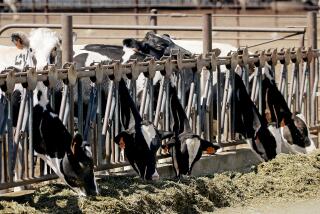Milk Hormone Worries Some Farmers : Dairy: Smaller operators fear they’ll be squeezed out because they will be unable to weather price drops brought on by a production glut.
- Share via
CATLETT, Va. — The last thing dairy farmer Jimmie N. Eustace needs is a drug to make his 190 Holsteins produce more milk.
There’s too much on the market already, Eustace said, struggling on a bright autumn morning to replace the bearings on his disking machine so he can plant wheat for forage.
These days Eustace, 58, is doing as much work as he can himself because equipment repairs cost 1993 prices while milk prices are at the level of more than a decade ago--a legacy of a production glut and lower demand.
“Why should we produce more milk?” he asked.
Across America’s dairy country, small- and medium-sized farmers are expressing similar concerns about synthetic bovine somatotropin, or bST.
Smaller farmers fear they’ll be the first squeezed out of business when bST hits the market because they, unlike bigger operations, will be unable to withstand additional price drops caused by increased production.
And although they may not like the drug, they’ll be forced to use it just to keep up.
The Food and Drug Administration could rule any day whether to let farmers inject their cows with the genetically engineered product, also known as bovine growth hormone, or BGH.
Advocates say the hormone is safe and will make the dairy industry more efficient. And they dismiss arguments that it will hurt some in the dairy industry, arguing that smaller farmers have been going out of business for years.
Four companies, Monsanto Co., of St. Louis; American Cyanimid, of Wayne, N.J.; Eli Lilly & Co., of Indianapolis; and Upjohn Co., of Kalamazoo, Mich., have applied for approval. Monsanto’s application, submitted nine years ago, is widely expected to be the first decided.
The FDA also must decide whether milk from cows treated with the hormone should be specially marked.
Scientists and the grocery industry argue there’s no legal basis to require labeling because the hormone is safe for humans and animals and milk from cows injected with it is no different than any other.
Generally, farmers want their cows to produce as much milk as possible, but things are different now.
Low demand for milk products here and abroad has made this a bad year for dairy farmers, who received $12.70 per 100 pounds, or 11.6 gallons, for their milk in September.
That’s compared with $13.50 a year earlier and closer to the 1979 average of $12.02.
Farmers in Fauquier County consider $12.80 a break-even price.
“There’s more and more people who feel that milk is not a necessary thing in their diet,” said Kenneth K. Smith, 42, who milks a herd of 220 in nearby Remington. “Why do we need a hormone that turns the consumer off?”
Other farmers like James Craun, 53, who milks a herd of 80 in Calverton, worry about the changes the hormone will cause in caring for cows. Increased production can cause cows to start pulling nourishment from their bodies if they’re not fed enough, and can also make the animals more prone to udder infections.
“You may get more milk for a short period of time but you’re going to ruin her,” Craun said.
Because of the worries, Congress intervened in the regulatory process when it passed President Clinton’s deficit-reduction bill in August.
A provision blocks the sale of BGH for 90 days after its approval. During that time, the White House Office of Management and Budget must examine the impact of the drug on consumers, family farms and government spending on surplus milk products.
More to Read
Inside the business of entertainment
The Wide Shot brings you news, analysis and insights on everything from streaming wars to production — and what it all means for the future.
You may occasionally receive promotional content from the Los Angeles Times.











